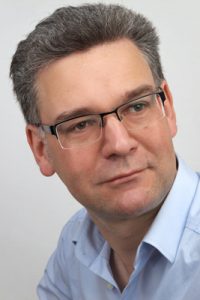Der Internationale Kammerchorwettbewerb in Marktoberdorf, 2.-7. Juni 2017
Tim Koeritz, Musikjournalist und Sänger
Ungewohnte Hip-Hop-Klänge waren dieses Mal beim 15. Internationalen Kammerchorwettbewerb in Marktoberdorf im Allgäu zu hören. Zum ersten Mal stand die Kategorie „Populäre Chormusik“ auf der Agenda. Sogar der Dirigent des Pop-Chores „Greg is back“ aus Augsburg, Martin Seiler, griff dabei selbst zum Mikrophon. Das Mikrophonsingen, es gehört schließlich zum Pop-Vocal-Sound selbstverständlich dazu, und „Greg is back“ versteht sich als „kompromissloser Popchor“, wie Martin Seiler herausstellt: „Wir sind ein Chor, der einfach den breiten Pinsel und die große Bühne sucht und voll mikrophoniert auch einen großen Sound anstrebt, einen Popsound, so dass das Publikum nicht unterscheiden kann, ob es jetzt in einem Konzert von Coldplay, Genesis oder in einem Chorkonzert von uns ist, das ist das Ziel, deswegen sage ich „kompromisslos“, was wir hier aber nicht umsetzen dürfen. Der Chor darf nicht einzeln mikrophoniert werden, sondern hat nur so eine Bühnen-Mikrophonierung, was immer etwas leerer klingt, und wir haben nur die Erlaubnis für vier zusätzliche Mikrophone, das sind bei uns ein Beatboxer, ein Bass- und zwei Solisten-Mikrophone. Wenn wir selber Konzerte machen, haben wir, glaube ich, über 40 Mikrophone auf der Bühne.“ Am Mischpult sitzt normalerweise auch der eigene Tontechniker.
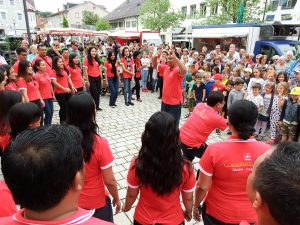
Doch im Mekka des klassischen Chorgesangs Marktoberdorf werden die technischen Begrenzungen wohl bleiben, so Jury-Vorsitzender Matthias E. Becker in seinem ersten Resümee: „Ich glaube, individuelle Mikrophonierung wird rein aus zeitlichen Gründen nicht möglich sein. Da müssten wir das Festival zwei Tage länger machen, damit alle Chöre ihren Soundcheck haben. Ich weiß von „Greg is back“, die brauchen 5-6 Stunden. Ich denke, dafür, dass wir das zum ersten Mal gemacht haben, ist es dennoch sehr gut gelaufen. Wir hatten sechs Bewerber, zwei durften aus politischen Gründen leider nicht ausreisen, deshalb hatten wir nur vier Chöre. Das nächste Mal werden wir sicherlich mehr Teilnehmer haben und wir versuchen in unseren Ausschreibungen präziser zu sein.“ Für Jürgen Budday, den künstlerischer Leiter des Wettbewerbs in Marktoberdorf, war es wichtig „eine neue Farbe hineinzubringen, um so auch ein neues Publikum anzusprechen. Ich denke, damit sind wir auch absolut zeitgemäß. Und was in Marktoberdorf in allererster Linie zählt, ist die Qualität. Und die Pop-Chöre haben in der Zwischenzeit eine so hohe Qualität, dass ich sie hier einfach mal hören möchte“.
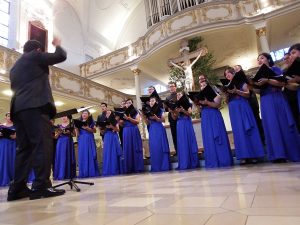
Dennoch ist es durchaus schwierig, einen Pop- und Jazzchor als solchen zu definieren. Dies zeigte sich bei den angetretenen Ensembles überaus krass. War das überhaupt noch Popmusik, was der philippinische Chor „Los Cantantes de Manila“ da auf die Bühne brachte? Unter der Leitung von Darwin Vargas entsprach der Chor zwar mit seinen Stücken wie zum Beispiel „Canta“ von Guido Lopez Gavilan der geforderten Vorgabe, mindestens einen Titel im Latin-Stil zu singen. Doch der unbenommen virtuosen rhythmischen Gestaltung, der großen Stimmgewalt und der Ausstrahlung des Chores stand sein pop-untypischer Belcantoklang gegenüber. Dennoch gewannen sie zusammen mit dem Detmolder Hochschulchor „Pop-Up“ den ersten Preis im Wettbewerb. Gefordert waren in der Kategorie „Populäre Chormusik“ neben einem Latin-Titel ferner eine Rubato-Ballade sowie ein neues eigenes Arrangement zum Jazz-Standard „Round (about) Midnight“ des Jazz-Pianisten und -Komponisten Thelonious Monk, denn in der populären Kategorie ist weniger ein Komponist als ein Bearbeiter von Vorhandenem, sprich ein Arrangeur, gefragt. Während im Augsburger Chor „Greg is back“ der Chorleiter selbst fast ausschließlich die Arrangements liefert, lässt Anne Kohler, Gründerin sowie Leiterin des Chores „Pop-Up“, sich diese schreiben. Für sie gibt es klare Kriterien für ein gutes Arrangement: „Ich finde, das Wesentliche ist, dass die Botschaft der Melodie gut rüberkommt, also, dass die Instrumentierungen stimmen. Und das bedeutet, dass die Basslinien kreativ und erfindungsreich sein müssen. Dass so eine Vocal-Percussion gezielt und dezidiert eingesetzt werden muss. Dass die Voicings gut singbar sein müssen, aber nicht plump daliegen, dass die Lagen, in denen die Melodie liegt, wohl überlegt sein müssen. Das sind ja ganz andere Lagen im Jazzchor. Wenn ich eine Melodie in den hohen Sopran lege, dann klingt das ganz schrecklich, weil die Soprane dann sofort klassisch klingen. So eine Melodie muss für eine hohe Tenorlage geschrieben sein oder eine richtige „saftige“, satte Altlage.“ Nicht nur stimmlich fantastisch, sondern auch enorm stilsicher, erhielt „Pop-Up“ zu Recht einen der beiden ersten Preise im Wettbewerb.
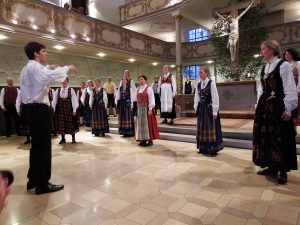
Stimmqualitäten zählten natürlich auch in der Kategorie A, bei den gemischten Chören, bei denen es schon bessere Jahrgänge in Marktoberdorf gegeben hat. Einmal mehr errang hier im Feld der elf Chöre aus neun Ländern ein skandinavischer Chor, der Kammerkoret NOVA aus Oslo, einen der beiden ersten Preise. Ihn leitet der erst 27jährige Yuval Weinberg. Der gebürtige Israeli, der zudem den Sonderpreis für die beste dirigentische Leistung im Wettbewerb erhielt, studierte in Berlin und Oslo und war bereits Gastdirigent mehrerer Profichöre. Den typisch skandinavischen Klang seines Chores kennzeichnet Yuval Weinberg als „sehr direkt platziert, „vorne“ sozusagen, und er hat Wärme, finde ich. Ich darf das als Ausländer sagen, weil ich selber nicht aus Norwegen komme. Für mich war das etwas ziemlich Neues. Ich bin erst seit zweieinhalb Jahren in Norwegen.“ Die hervorragende Non-Vibrato-Qualität und besondere Homogenität des Chores überzeugte in der Kür, dem zweiten Durchgang, vor allem in einem norwegischen Volkslied-Arrangement, bei dem der Sopran zu Beginn im Unisono ungemein faszinierte. Der besondere Zusammenklang im Unisono ist wohl das Schwerste für einen Chor oder eine Stimmgruppe. „Das ist das Ziel”, so Yuval Weinberg, „dass alle Personen zusammen als eine Person klingen, aber dass trotzdem jeder seine eigene Identität behält, und so arbeiten wir auch oft. Nicht, dass wir alle genau diese Farbe haben, sondern mit den Farben, die wir haben, eine Farbe zusammen erreichen.“
Homogenität ist auch bei romantischen Werken elementar, genauso wichtig ist ferner eine weitgespannt-fließende Phrasierung, die gerade den asiatischen Chören aus Indonesien und Singapur nicht gelingen wollte. Hinzu kam im Fall des norwegischen Chores die fein abgestufte Differenzierung der Lautstärken, die man zum Beispiel in Rheinbergers „Kyrie“ aus dessen „Cantus missae“ hören konnte. Für diese überzeugende Darbeitung erhielt der Kammerkoret NOVA aus Oslo zu Recht einen Sonderpreis für die beste Interpretation eines romantischen Werkes im Wettbewerb.
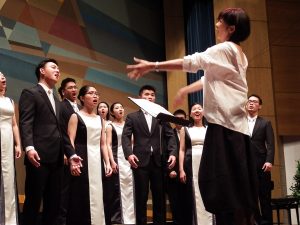
Als Pflichtwerk stand für alle Chöre dann die Uraufführung von Wolfram Buchenbergs Chorwerk „The Emigrant“ an, komponiert nach einem über 100 Jahre alten Poem des irischen Dichters Joseph Campbell. Buchenberg, selbst Allgäuer, ist dem Wettbewerb seit langem mit seinen Chorwerken verbunden. Der alte irische Text spiegelt die aktuelle Thematik von Flucht und Emigration in ihrer ganzen Ambivalenz. „Der Text zeigt“, so Buchenberg, „was in so einem Menschen vorgeht, der in fünf Stunden seine Heimat verlassen muss.“ Es ist ein Chorwerk, das rhythmisch und auch stimmlich den Chören einiges abverlangt Für Buchenberg ist es vor allem wichtig, wie die Chöre die einkomponierten „Stimmungsumbrüche hinkriegen, schnell von Sekunde auf Sekunde. Das ist eine der Schwierigkeiten des Stücks. Daran zeigt sich, wie gut der Chor ist.“
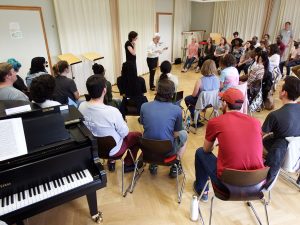
Der ONE Chamber Choir aus Singapur unter der Leitung von Lim Ai Hooi interpretierte das Pflichtstück am lebendigsten, sehr transparent und ausdrucksstark. Die hellen jungen Stimmen entsprachen hier dem Geist des Werkes besonders gut. Im Wettbewerb erhielt dieser Chor einen von insgesamt zwei zweiten Preisen. Der andere zweite Preis ging an den argentinischen Universitätschor aus Mendoza. Universitätschöre prägten fast schon das Bild des Wettbewerbs. Auch die beiden deutschen Chöre, die hinter den Erwartungen zurückblieben, OPUS VOCALE und der Kammerchor des Collegium Musicum, sind der FU bzw. TU Berlin angegliedert. Hier steht die bulgarisch-stämmige Donka Miteva dem Chor vor. Sie zeigte sich besonders angetan vom Charakter dieses Wettbewerbs, der nicht nur Wettbewerb sein will, sondern in gemeinsamen Konzerten und ökumenischen Gottesdiensten auch das Miteinander fördert: „Wir fanden das alle toll. Der gesamte Chor war von dem Gottesdienst begeistert, vor allem, weil der ökumenische Charakter des Gottesdienstes auch sehr inklusiv war. Hinzu kamen die musikalischen Beiträge auf diesem hohen Niveau, einerseits mit den Chamber Singers aus Georgia USA und zum Glück auch mit uns, das war auch für uns ein großes Erlebnis, noch einmal in einem anderen Rahmen hier aufzutreten.“
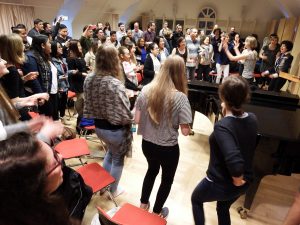
Auf der Ebene des reinen Leistungsvergleiches hört sich das Fazit des Jurors Georg Grün, der der Jury der Kategorie der klassischen Chöre vorstand, am Ende so an: „Dieses Mal war das Feld sehr, sehr dicht beieinander mit völlig unterschiedlichen Charakteren, Typen, Stücken, und dadurch war das sehr schwer. Da die Jury ja international besetzt ist, aus mehreren Kontinenten kommt, konnten diese ganz verschiedenen Ansichten einfließen. Das dauert dann alles wesentlich länger. Aber persönlich find ich das eigentlich viel interessanter, als wenn man sich schon nach fünf Minuten einig ist und weiß, wer der Gewinner ist.“ Auch bei den Gewinnern standen sich schließlich zwei ganz unterschiedliche Chor-Typen, ja Klangtypen, gegenüber. Neben dem erwähnten norwegischen Chor gewann nämlich der US–amerikanische Universitätschor, die Georgia State University Singers, ebenfalls einen ersten Preis. Der Chor anders als die Norweger oft bis an die Grenze, ja forciert den Klang sogar ins Vibrato hinein, und dies nicht nur beim Gospel-Gesang.
Tim Koeritz, geb 1965 in Stade (Niedersachsen), studierte zunächst Musik mit dem instrumentalen Hauptfach Klavier sowie Geschichte für das Lehramt an Gymnasien in Hannover und Freiburg im Breisgau. Nach seinem Referendariat in Hildesheim und dem zweiten Staatsexamen schloss sich ein zweijähriger Aufbaustudiengang Rundfunkmusikjournalismus am Institut Lernradio der Musikhochschule Karlsruhe an, das er 1998 mit dem Diplom abschloss. Seit 1998 arbeitet und wohnt er in München. Von hier aus arbeitet er freiberuflich als Hörfunkjournalist für verschiedene ARD-Rundfunk-Anstalten (u. a. für den BR, WDR, die Deutsche Welle und Deutschlandradio Kultur). Sein Schwerpunkt liegt neben der zeitgenössischen Musik auf dem Gebiet der Chormusik. Zu seiner Arbeit als Musikjournalist gehört ferner das Verfassen von Programmheft-Texten. So arbeitet er z. B. für den via-nova-chor München, die Theatergemeinde Augsburg und deren Konzertreihe „Philharmonische Matinee“ sowie der sommerlichen Open-Air-Veranstaltung “Konzerte im Fronhof” als auch für Konzert-Reihen des Kulturzentrums k1 der Stadt Traunreut. Musikpädagogisch arbeitet Tim Koeritz seit dem Jahr 2005 als Dozent an der Münchner Volkshochschule im Fachgebiet Musik und Musikverständnis sowie im Bereich des Studium Generale. Dort gibt er Kurse zur Musiktheorie und Musikgeschichte sowie Einführungen in die Konzerte der Münchner Philharmoniker. Ferner ist er in München freiberuflich als Klavierlehrer tätig. Seit dem Jahr 2000 singt er im via-nova-chor München, einem Chor, der sich auf die zeitgenössische Chormusik spezialisiert hat. Ehrenamtlich engagierte er sich dort mehrere Jahre als erster Vorsitzender des Vereins der Freunde des via-nova-chores e.V. Dies umfasste Aufgaben im Bereich des Fundraisings, Sponsorings, Marketings, der Öffentlichkeitsarbeit und der Konzertorganisation. E-Mail: tim.koeritz@t-online.de
